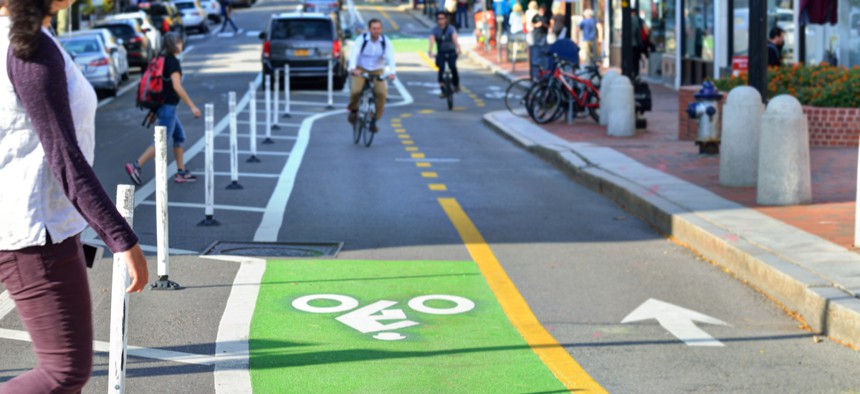Connecting state and local government leaders
A comprehensive study of crash and street design data from 12 cities finds that roads with protected bike lanes make both cycling and driving safer.
If you encounter a Baltimore bicyclist who seems a little on edge of late, forgive her. On top of the usual risks posed by cycling in a city whose drivers have been convincingly ranked as the very worst in the United States, riders there are dealing with a special new psychological trauma: The city keeps ripping out protected bike lanes it only recently installed.
Why? To reclaim the streets for parking, of course, after complaints from car-using residents. Or, in the words of a city spokesperson upon the removal of a neighborhood cycle track in April: “We are looking to build bicycle tracks or infrastructure that works, not just for the bicyclist or the community, but everyone. That’s our main goal.”
Unmentioned in Baltimore’s latest bikelash is something that might conceivably make drivers more supportive of protected bike lanes: Protected lanes for cyclists make them safer, too. That’s according to a comprehensive new study published in the Journal of Transport and Health. Researchers at the University of Colorado, Denver and the University of New Mexico found that protected and separated bike lanes are strongly linked to lower fatality and injury rates not only for people on bikes, but for people in cars.
“If you’re going out of your way to make your city safe for a broader range of cyclists … we’re finding that it ends up being a safer city for everyone,” Wesley Marshall, a University of Colorado Denver engineering professor and a co-author of the paper, told Streetsblog.
Marshall and his co-authors analyzed 13 years of crash and street design data from 12 large U.S. cities to understand what makes some more deadly than others. They tested three hypotheses. Is it “safety in numbers”—that is, do larger shares of bike riders make drivers more careful around bikes? Or do differences in a city’s socioeconomic and demographic composition—for example, fewer children and elderly folks, or more affluent residents—lower the risk of fatalities? Or, lastly, is it all about the built environment—do street design elements such as lots of intersections and protected bike lanes slow down drivers and keep crashes from happening?
The authors amassed a huge data set: 17,000 fatalities and 77,000 severe injuries between 2000 and 2012 in Minneapolis, Seattle, San Francisco, Denver, Portland, Dallas, Houston, Austin, Oklahoma City, Kansas City, Memphis, and Chicago. All these cities have experienced a rise in cycling’s popularity, have added bike amenities at various levels of investment, and have seen a range of safety outcomes over the years. (Due to a lack of available data, some cities that might have been included, such as Baltimore, were not.) They then tested those outcomes against features like census data and street design elements.
The authors found that “safety in numbers” had very little statistical link to fatality rates; indeed, higher shares of cyclists were actually associated with worse rates of severe injuries. So strike that theory. But socioeconomic and demographic differences did seem to play a role. Where there are more white and affluent residents, there was less death and critical harm resulting from collisions—consistent with the body of research that suggests that people of color are more vulnerable to road violence for a host of reasons.
But the most important safety factor was right on the pavement. Separate and protected bikes lanes were the strongest indicator of lower fatality and injury rates. Where cycle tracks were most abundant on a citywide basis, fatal crash rates dropped by 44 percent compared to the average city, and injury rates were halved. While cyclists benefited from having painted bike lanes as well as fully separated bike lanes in terms of safety, what paid off the most for all road users—drivers included—were protected lanes fortified with stanchions, planters, and the like.
To repeat: Though the study doesn’t try to explain why, this is evidence that protected cycle tracks lower traffic safety risks for drivers, too. And by the way, those shared-lane markings, also known as “sharrows,” were just as useless as ever. Marshall’s previous research suggests they might even do harm: “You’re better off doing nothing,” he told Streetsblog. “It gives people a false sense of security that’s a bike lane.”
One might think such research should help inform the aggrieved bikelash debates happening in Baltimore and most certainly beyond. While separated lanes might mean sacrificing some parking for motorists, Marshall’s new study suggests that they’re gaining something far more important: percent points on their chances of survival to drive another day.
Alas, the short-term win of a curbside spot seems to be of utmost importance in the minds of many vocal residents in communities around the country. “Where does it stop?”asked Liz Cornish, head of the local advocacy group Bikemore, after portions of another protected lane was removed in early May. “If we keep conceding that parking is more important than the safety of people of people using bikes and motorized wheel chairs, that’s an issue.” And if parking turns out to be more important to drivers than their own safety? That’s a bike lane debate that no one is winning.
Laura Bliss is CityLab’s west coast bureau chief, covering transportation and technology.

NEXT STORY: High clouds: High impacts, high baselines and high-flying data



